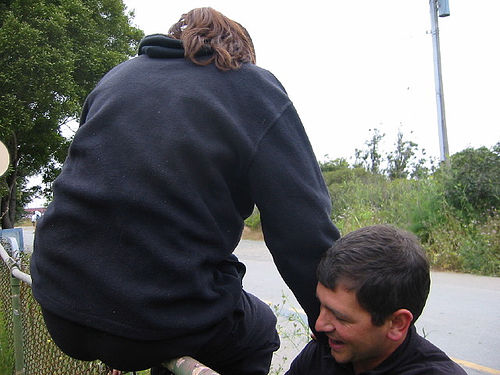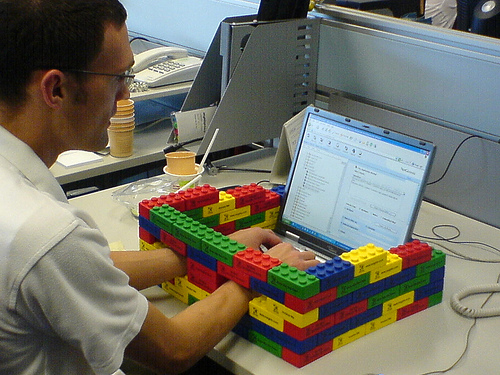Most hotels offer wi-fi but will charge you the cost of a hostel room for one. It’s expensive but there are a few tips and tricks you can try – some of which I’m certain aren’t legal. Whether you do them or not is up to you but these tactics are another part of a traveler’s guide to hacking wireless networks.

Start With The Obvious
Go to the lobby and ask if they have any promotions, coupons, or ways you can test the Internet connection without actually paying for it. Like the gift shop at many airports, you can sometimes get a complimentary hour or so of wi-fi if you just ask. We’ll assume that this didn’t work and there is no free Internet available. The next step is to download NetStumbler, or some application like it, to detect all of the wireless networks active within range. (You can extend this range using a long range USB antenna.) There might be an open access point in a nearby apartment complex that you can use to get online.
- Remember, think like a hacker and go from easiest to hardest. Try to go around security, not through it.
- Do Some URL Hacking. According to this method, adding a ?.jpg at the end of a website you want to get to may just work (i.e. http://www.google.com/search?.jpg)
 Find The Walls
Find The Walls
These methods aren’t full proof and you’ll need to set aside about 10-15 minutes to test a few things but the strategy is the same. For most people “online” is synonymous with a Web browser. Know that for most hotel wi-fi, there is gateway put up between your machine and the Internet which blocks mostly certain types of Internet traffic and queries. Also, in addition to blocking, the gateway must have a way to authenticate which computers and people have paid are allowed Internet access.
- Change Some HTML – Vinh Pham has a clever little hack around the wireless at Hilton hotels, which encodes their wi-fi pricing in HTML. That means it’s easily changeable, and a good way to do so is to download the free Firebug, find the price ($) value, and change it to something closer to zero.
Some Advanced Hacking
These two methods are for advanced users or those who’ve got insomnia and are trying to get online to watch the latest episode of Lost. Thomer has two methods to try and work your way using NSTX (you’ll need your own server) or ICMPTX. Like I said, these methods are gritty but it won’t hurt you to give them a try (preferably from a virtual machine).
Below is a method (demonstrated on Mac, but possible on Windows/Linux as well) where you change (spoof) your IP and MAC addresses to match someone else who has already authenticated and is on the network.
This is just the beginning of wireless hotspot hacking, most places implement different types of blocks and you’ll have to be adept at finding and manipulating IP and MAC addresses. It may sound intimidating but it’s free to try and you won’t won’t be out any money if you fail.
[photos by: Salim Virji, lloydi]









{ 20 comments… read them below or add one }
Oh how I wish I had your level of tech ability. Still, there’s some good stuff I can try next time that’s not beyond my abilities. Thanks – will report back if I have any success.
Good luck Barbara, the IP/MAC hack in the video is a pretty straightforward and easier way to get around the blocks. There are a few other methods I didn’t mention that I thought got too technical, but they involve reading the wireless traffic and trying to pull out password information from there.
Some of these firewalls also only block DNS, so you can get to some sites just by typing in their IP address directly. On Mac, open the terminal, type “ping IP ADDRESS” (e.g. ping 213.86.83.116) if that works, it’s a start 🙂
I’m trying to figure out your choice of photo at the start of the article! 😀
haha, I was going for the ‘hop over the fence/go around security’ metaphor 🙂
Nice, thanks for these. Hotels charging for wireless is the biggest scam out there, and there’s not many things that irk me more about traveling. We all know how cheap wireless is, and these hotels that charge $10/day to access theirs is just ridiculous. I wish they would just raise their rates and not tell me about it. It’s like charging you if you turn on the television and access the cable. There’s no difference.
I’ll definitely be bookmarking this for my next trip. Thanks again.
When I was in Ireland, the hostels I stayed in for 10 Euro a night provided free (fast) wifi while the hotel hosting the conference I was attended charged 20 Euro a day! That’s way too much, even if you are going to charge the rates should be reasonable. This guide and the tricks in it should come in handy though and will hopefully help you avoid a charge or two.
If the fee in any way represented their cost, then that wouldn’t be so bad. It is the arrogant grab for cash ($20 and $25 for 24 hours access, when they know people want to check email for 10 minutes in most cases). Libraries are oftena good source for a free burst of internetting.
I agree, what most hotels charge is outrageous. I’d rather they just increase the price of a room by a few dollars and be done with it.
I think you people are forgetting some important factors here.
Wifi for you at home is very cheap, in a hotel with 1000 rooms it’s VERY expensive.
These hotels require a tonne of access points (that aren’t normal home access points) and a very different connection speed in order to allow 10s and hundreds of people to use the internet at the same time without the speed being ridiculously low.
It costs a hundred thousand to install in such a place, and thousands per month to maintain.
It varies by hotel and your points are valid although for such large hotels increasing the room rates by a percentage or two could probably easily offset the costs. You’re making a hypothetical argument.
Not so. In fact, in many many cases, the hotels are called on by numerous internet service providers who provide the equipment at cost, or in a LOT of cases, for no cost, to get the internet contract.
I used to work for a company that did just that. If we could get the contract for three to five years providing internet access, we would often install the equipment for free. Now it’s true that the cost of internet for them was substantially higher than a resi service, your still only talking several hundred dollars a month. If the hotel added $2US per night to every room they had, they were doubling their monthly internet charge in income with only 30-40% room capacity, no guest would notice, let alone complain, and they’d get that money whether or not ANYONE used the service. There’s no need to charge a daily fee other than for pure cash. It ISN’T to cover the costs of the equipment.
Hello,
Is there a way to use a hotels wireless network with a travel router and not have to pay for the connection? If you plugged the cable from the hotel in your router would that work?
thank you
If you plugged in to the hotel’s router, than chances are very good you could connect that way. Though you’d need a hard wire connection to add another router *without* having to hack the wireless itself.
I’m going to stay in a Hyatt hotel for 10 days and they want to charge more than 150 dollars for the wifi internet use!
I am trying to see the youtube video but it says it is private. Any way it could be made available again?
Thanks!
That is an absurd price – wish I could help you but the video is not mine to make public. There are a few more on YouTube though on how to spoof IP and MAC addresses.
Sorry, i thought the video was yours 🙂 I will look up on the internet the ip and mac spoofing, otherwise I’ll just try the DNS method.
Thank you for the article!
No problem and good luck!
The URL trick is clever. I noticed at some hotels that after I submit for wifi, the response.redirect provided querystring values such as mac, name, etc.
Another tip would be to try and find out what application the hotel is using to monitor the wifi. Then, research that applicaiton.
Good advice, most such services have lots of freely available information (read: vulnerabilities) posted online.
You could simply try changing your computer’s DNS settings , using a free vpn or perhaps Torbrowser. It’s slow but the heavy encryption means the hotel can’t really tell what your doing.